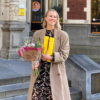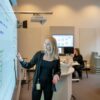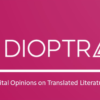Interviews

Interview: How Mirko Tobias Schäfer relates to the theme of the conference “Rethink Impact”
This year’s theme of the ECREA (European Communication Research and Education Association) 2022 conference in Denmark is ‘Rethink Impact’. The organization of the conference interviewed Mirko Schäfer on this theme. Schäfer is cofounder and Faculty of Science Lead of the Utrecht Data School and Associate Professor at UU. Read the interview here.
Read more
One year of Living Lab Digital Humanities, how does it work in practice?
Joint programming in Python, the best place for hybrid meetings and fiddling with screens and microphones. The Living Lab Digital Humanities, a collaboration of the University Library and the Centre for Digital Humanities, was launched a year ago. Who uses this ‘workshop’ for digital research and education? What can you do there and what could be…
Read more
Interview with Suzanne Ros, winner of the Digital history thesis award
During her research into the term ‘Anthropocene’ for her bachelor’s thesis in history, Suzanne Ros discovered that the subject was much larger than she had expected. She decided to dive into digital methods that could help her with her analysis, and she taught herself Python through YouTube videos. Successfully. She won the recently created thesis…
Read more
Automated systematic text reviewing in the Living Lab Digital Humanities
Since the summer, Prof. dr. Rens van de Schoot has been making weekly use of the Living Lab Digital Humanities in the Utrecht University Library City Centre with his Automated Systematic Review group (ASReview group). He talks about the added value of the Living Lab DH, working during the lockdown and expectations for the future. The Living…
Read more
Looking for patterns in readers’ reviews of translated books using DIOPTRA-L
What do English readers expect from translated literature? And how about the Dutch? Professor Haidee Kotze and her research team used big data to look for patterns in the way that ordinary readers review translated literature. Together with the Digital Humanities Lab they developed DIOPTRA-L, a corpus with 280.000 reviews of more than 150 books…
Read more
The Digital Humanities Lab develops digital toolset for major European research project ‘People and Parliament’
The Utrecht Digital Humanities Lab will collaborate with the University of Jyväskylä (Finland) on the political-historical research project ‘People and Parliament’. This collaboration between software developers and historians enables groundbreaking research into parliamentary data. ‘People and Parliament’ is an ambitious project. The research focuses on the use of political language in the national parliaments of…
Read more
Technical help and inspiration in the Living Lab Digital Humanities
On the 20th of May, the Living Lab Digital Humanities will open in the University Library City Centre. Prof. Dr. Hugo Quené, Professor of Quantitative Methods of Empirical Research in the Humanities, talks about this cooperation between the Centre for Digital Humanities and the library. What is the Living Lab Digital Humanities?The Living Lab Digital Humanities will be a…
Read more
